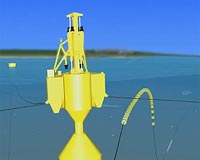 |
New Delhi, India (AFP) Oct 22, 2009 Indian Prime Minister Manmohan Singh argued Thursday that innovations in "green" technology should be shared with developing countries in much the same fashion as HIV/AIDS drugs. Labelling new, clean-energy discoveries "global public goods," Singh said the attached legal copyright regime should balance rewards for the innovators with the need to promote the common good of humanity. "Suitable mechanisms must be found that will provide incentives for developing new technologies while also facilitating their deployment in developing countries at affordable cost," Singh told a climate technology summit in New Delhi. The prime minister cited a precedent in the case of pharmaceutical technologies being made available for the benefit of HIV/AIDS patients in developing countries. "The moral case of a similar approach for protecting our planet and its life support system is equally compelling," he said. The transfer of clean-energy technology will be a key issue at UN climate talks in Copenhagen in December aimed at hammering out a new global climate treaty to replace the Kyoto Protocol which expires in 2012. India has been a stalwart member of the G77 group of developing nations which want rich countries to provide them with finance and technology to help reduce harmful emissions that cause climate change. India and China have refused to sign on to binding targets for emissions cuts, arguing that it would cap their economic growth and insisting that the developed world should shoulder the main responsibility for mitigating global warming. "Developing countries cannot and will not compromise on development," Singh told Thursday's summit. The main challenge, he said, was to find a way of "collapsing the time" between the development of new technologies and their large-scale adoption in the developing world. "We need technology solutions that are appropriate, that are affordable and that are truly effective," he added. India and China, two of the world's biggest polluters, signed a climate change agreement Wednesday that included a commitment to cooperating on technology development.
earlier related report Speaking at a climate-change conference in New Delhi Thursday, President Mohammad Nasheed called attention to the Maldives' vulnerability to climate change and appealed to neighboring India to help his country survive the rising seas that threaten to submerge the Maldives archipelago as a result of global warming. "India led the world in the agricultural, green revolution of the 1970s," said Nasheed. "I believe it is in India's national interest to lead the world again, in the green power revolution," he said, adding that India has "the moral authority that comes with being the world's largest democracy," reports Maldives independent news service Minivan. In 2007 the U.N. Intergovernmental Panel on Climate Change predicted that rising sea levels of up to 58 centimeters would swamp many of the Maldives' 1,192 low-lying islands. Nasheed called for a reduction of the concentration of carbon dioxide in the atmosphere to 350 parts per million from the current level of 387. "Here is the inconvenient truth: We need to peak global emissions, not in 10, 20 or 50 years, but now," he said. The president said that even though the West had been polluting for more than a century, this did not mean the developing world was free from responsibility. "We, in the developing world, say we are innocent of the climate crime. Compared to rich, heavily polluting countries, we are innocent," Nasheed said. "But, with each passing day, as our emissions soar, we become more complicit in the climate crime." To rise to the challenge of climate change, he said, nations should embrace renewable technology and provide green energy at a cheaper cost than fossil fuels. Stressing that the Maldives wants "to focus less on our plight and more on our potential," the president said his country plans to go carbon neutral within a decade by switching to 100 percent renewable energy. Currently, the Maldives' emissions are 2.4 tons per person annually, Nasheed said. His aim is to reduce that amount to zero. Since coming to power last year, Nasheed has been outspoken about climate change. On Friday the Maldives government ministers held the first underwater Cabinet meeting to highlight the threat of global warming. "For the Maldives, climate change is no vague or abstract irritation, but a clear and present danger to our very existence," the president said at the New Delhi conference. "We don't want to trade paradise for an environmental refugee camp." Share This Article With Planet Earth
Related Links Powering The World in the 21st Century at Energy-Daily.com
 Ireland developing wave energy
Ireland developing wave energyDublin, Ireland (UPI) Oct 21, 2009 Swedish energy giant Vattenfall wants to develop ocean wave energy in Ireland. The utility earlier this week announced it had partnered with Irish green energy company Wavebob to form a joint venture called Tonn Energy that will research and develop commercial-scale ocean wave energy off Ireland's western coast. "With its magnificent ocean wave resource and commitment by the ... read more |
|
| The content herein, unless otherwise known to be public domain, are Copyright 1995-2009 - SpaceDaily. AFP and UPI Wire Stories are copyright Agence France-Presse and United Press International. ESA Portal Reports are copyright European Space Agency. All NASA sourced material is public domain. Additional copyrights may apply in whole or part to other bona fide parties. Advertising does not imply endorsement,agreement or approval of any opinions, statements or information provided by SpaceDaily on any Web page published or hosted by SpaceDaily. Privacy Statement |